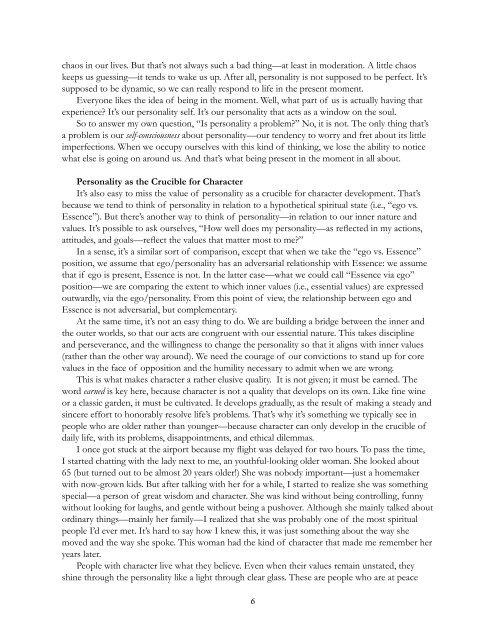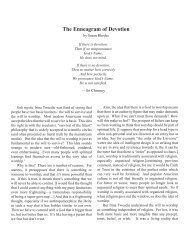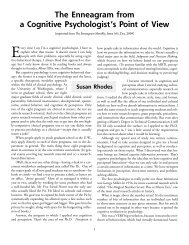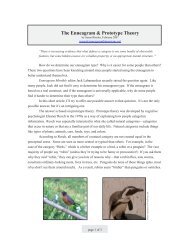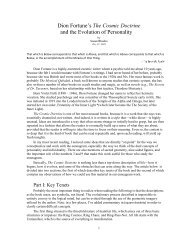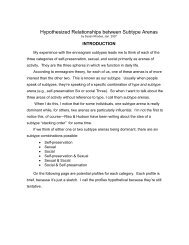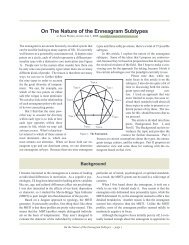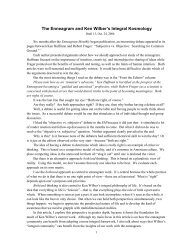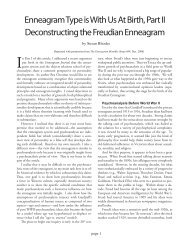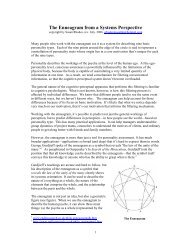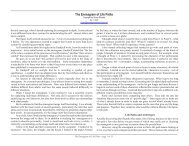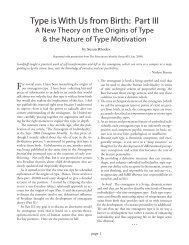The Enneagram of Individuality - Enneagram Dimensions
The Enneagram of Individuality - Enneagram Dimensions
The Enneagram of Individuality - Enneagram Dimensions
You also want an ePaper? Increase the reach of your titles
YUMPU automatically turns print PDFs into web optimized ePapers that Google loves.
chaos in our lives. But that’s not always such a bad thing—at least in moderation. A little chaos<br />
keeps us guessing—it tends to wake us up. After all, personality is not supposed to be perfect. It’s<br />
supposed to be dynamic, so we can really respond to life in the present moment.<br />
Everyone likes the idea <strong>of</strong> being in the moment. Well, what part <strong>of</strong> us is actually having that<br />
experience It’s our personality self. It’s our personality that acts as a window on the soul.<br />
So to answer my own question, “Is personality a problem” No, it is not. <strong>The</strong> only thing that’s<br />
a problem is our self-consciousness about personality—our tendency to worry and fret about its little<br />
imperfections. When we occupy ourselves with this kind <strong>of</strong> thinking, we lose the ability to notice<br />
what else is going on around us. And that’s what being present in the moment in all about.<br />
Personality as the Crucible for Character<br />
It’s also easy to miss the value <strong>of</strong> personality as a crucible for character development. That’s<br />
because we tend to think <strong>of</strong> personality in relation to a hypothetical spiritual state (i.e., “ego vs.<br />
Essence”). But there’s another way to think <strong>of</strong> personality—in relation to our inner nature and<br />
values. It’s possible to ask ourselves, “How well does my personality—as reflected in my actions,<br />
attitudes, and goals—reflect the values that matter most to me”<br />
In a sense, it’s a similar sort <strong>of</strong> comparison, except that when we take the “ego vs. Essence”<br />
position, we assume that ego/personality has an adversarial relationship with Essence: we assume<br />
that if ego is present, Essence is not. In the latter case—what we could call “Essence via ego”<br />
position—we are comparing the extent to which inner values (i.e., essential values) are expressed<br />
outwardly, via the ego/personality. From this point <strong>of</strong> view, the relationship between ego and<br />
Essence is not adversarial, but complementary.<br />
At the same time, it’s not an easy thing to do. We are building a bridge between the inner and<br />
the outer worlds, so that our acts are congruent with our essential nature. This takes discipline<br />
and perseverance, and the willingness to change the personality so that it aligns with inner values<br />
(rather than the other way around). We need the courage <strong>of</strong> our convictions to stand up for core<br />
values in the face <strong>of</strong> opposition and the humility necessary to admit when we are wrong.<br />
This is what makes character a rather elusive quality. It is not given; it must be earned. <strong>The</strong><br />
word earned is key here, because character is not a quality that develops on its own. Like fine wine<br />
or a classic garden, it must be cultivated. It develops gradually, as the result <strong>of</strong> making a steady and<br />
sincere effort to honorably resolve life’s problems. That’s why it’s something we typically see in<br />
people who are older rather than younger—because character can only develop in the crucible <strong>of</strong><br />
daily life, with its problems, disappointments, and ethical dilemmas.<br />
I once got stuck at the airport because my flight was delayed for two hours. To pass the time,<br />
I started chatting with the lady next to me, an youthful-looking older woman. She looked about<br />
65 (but turned out to be almost 20 years older!) She was nobody important—just a homemaker<br />
with now-grown kids. But after talking with her for a while, I started to realize she was something<br />
special—a person <strong>of</strong> great wisdom and character. She was kind without being controlling, funny<br />
without looking for laughs, and gentle without being a pushover. Although she mainly talked about<br />
ordinary things—mainly her family—I realized that she was probably one <strong>of</strong> the most spiritual<br />
people I’d ever met. It’s hard to say how I knew this, it was just something about the way she<br />
moved and the way she spoke. This woman had the kind <strong>of</strong> character that made me remember her<br />
years later.<br />
People with character live what they believe. Even when their values remain unstated, they<br />
shine through the personality like a light through clear glass. <strong>The</strong>se are people who are at peace<br />
6


